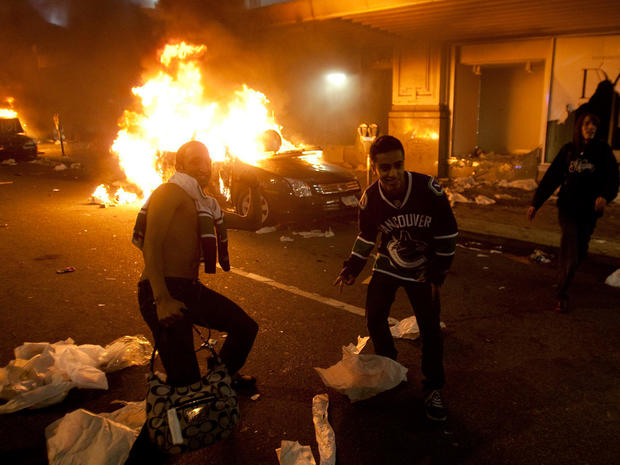Vancouver, we hardly knew you
I went to a riot and a city broke out.
In the wake of the Canucks' loss in the Stanley Cup final and Vancouver's chaos, we again wonder about the social implications of sport fan extremism. For decades behaviorists have approached violence in sport fanaticism by applying such theories as contagion, emergent social norms, and drive discharge. These ways of identifying, if not explaining, why normally rational people do abnormal irrational things offer us but a glimpse of head-scratching answers. Sport violence has been related to social class, inherited tradition, and regional identity. It has been compared to everything from religious extremism to "just some boys blowing off steam." Collective behavior, however, is a difficult phenomenon to study. You just can't seem to predict it and when it unfolds, there's nary a sociologist in sight.
The Vancouver episode is interesting for a variety of reasons. British Columbia is a vibrant region with a history of civic pride and responsibility. Vancouver's hosting of the 2010 Winter Olympics illustrated a certain "big picture" understanding of a host city's responsibility. Other than the episode after the Canucks' last failed Cup Final in '94, Vancouver has shown mostly class and taste as a Canadian sports town. So, why resort to car-tipping and stuffed bear-burning now when your team loses a game? A game, for Christ sakes?
Vancouver "embarrassed" by riots
The knee jerk pundits scramble for someone or something to blame. Pent up frustration, alcohol, a few thugs, the media; some of which may have bearing in fact but mostly it was all that and much, much more.
What I found the most interesting was how the venting or spontaneous, contagious (re)action or simple drunken rowdiness was focused on inanimate objects. Sure there were the odd brawls but the unadulterated wrath focused on that poor silver SUV almost made me want to buy stock in car companies. I understand burning the little teddy-Bruin in effigy and flipping cop cars, and beer bottles hurled at the TV screen for what they represent. But that poor pile of metal and glass must've got caught with the wrong bumper sticker.
Deviance in crowd behavior is often associated with perceived anonymity. No one will see me throw that cup-of-stale beer. No one will know it was me chanting those horrible verses. But Vancouver seemed purposely divided--those that mugged for the cameras while doing their best Iwo Jima atop that turtled-SUV and those that masked their mugs with bandanas and ski masks as they avoided security cameras and skulked out of looted boutiques with their pirated- booty in hand.
This much is and was predictable--in the wake of a misanthropic collective display, there will always be the opportunist, both professional and amateur, who will gain personally and materially. However, we cannot say that one is the cause and the other the result. To pursue that line of thought would suggest that commercial sport itself has become too much a focus in our lives. And for every Vancouver Collapse there are hundreds of feel-good sporting experiences.
Perhaps the most interesting aspect of the whole episode is the embarrassment that the city itself has displayed. Facebook pages directing public clean-up efforts, apologias instead of finger pointing...the humility in hangover doesn't excuse anything but it makes it all more human. So, perhaps one take-away is that as a species, we are designed more to find and express ourselves in our own play and not the athlete/hero/team over which we have no control. Lest we forget, that now corporate cliché--Just Do It--referred to athletic participation of the safe and sane variety.
Scott Tinley, a retired professional triathlete and two-time Ironman World Champion, writes about fallen heroes and teaches sport humanities courses at San Diego State University. His book Racing the Sunset: An Athlete's Quest for Life After Sport explores the world of pro athletes in transition.
